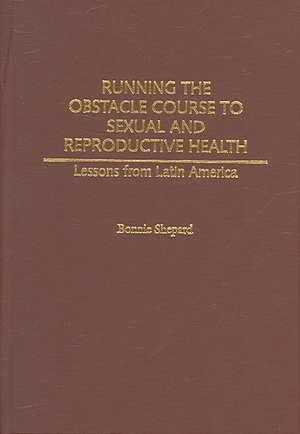Running the Obstacle Course to Sexual and Reproductive Health: Lessons from Latin America
Autor Bonnie Sheparden Limba Engleză Hardback – 29 mai 2006 – vârsta până la 17 ani
Preț: 401.97 lei
Preț vechi: 519.02 lei
-23% Nou
Puncte Express: 603
Preț estimativ în valută:
76.92€ • 82.25$ • 64.13£
76.92€ • 82.25$ • 64.13£
Carte tipărită la comandă
Livrare economică 18 aprilie-02 mai
Preluare comenzi: 021 569.72.76
Specificații
ISBN-13: 9780275970666
ISBN-10: 0275970663
Pagini: 240
Dimensiuni: 156 x 235 x 22 mm
Greutate: 0.48 kg
Editura: Bloomsbury Publishing
Colecția Praeger
Locul publicării:New York, United States
ISBN-10: 0275970663
Pagini: 240
Dimensiuni: 156 x 235 x 22 mm
Greutate: 0.48 kg
Editura: Bloomsbury Publishing
Colecția Praeger
Locul publicării:New York, United States
Notă biografică
Bonnie Shepard is a researcher, planner, and program evaluator. Currently she is Senior Planning and Evaluation Specialist for Social Sectors Development Strategies, Inc. in Boston, MA.
Cuprins
PrefaceIntroductionThe "Double Discourse" on Sexual and Reproductive Rights: The Chasm between Public Policy and Private ActionsNGO Advocacy Networks in Latin America: Lessons from Experience in Promoting Women's and Reproductive Rights"Let's Be Citizens, Not Patients!": Promoting Partnerships between Women's Groups and Health Services in PeruConversations and Controversies: A Sexuality Education Program in ChileCrosscutting IssuesBibliography
Recenzii
For close to 30 years, Shepard worked for the Ford Foundation and other funding agencies supervising Latin American projects concerned with women's rights, population control, and reproductive health. Recently she took time off to evaluate the success of the various programs and nongovernmental organizations (NGOs) with which she has had contact. The result is a series of case studies of projects, groups, and coalitions, primarily in Chile, Colombia, and Peru. In the strongest chapter, Shepard gives a nuanced yet admirably clear exposition of the Latin American/Roman Catholic tradition of double discourse. Abortion is branded as unspeakable as well as illegal, so feminist NGOs are constrained from agitating for legalization, especially since their funding comes increasingly from their governments. Yet except for periodic crackdowns, clandestine abortion clinics function more or less with impunity, at least in affluent neighborhoods. The result is safe access to abortion for privileged women, but dangerous conditions for the poor. This is not a book for those not already conversant in the terminology of NGOs and feminist health rights activism and familiar with the alphabet soup of UN declarations and international funding agencies. For specialists, however, the book is engrossing and thought-provoking. Recommended. Faculty and professionals.
This book provides excellent insight into the issues of sexual and reproductive health in Latin America. . . . The author is to be commended for conducting such a thorough analysis of the mechanisms at play when individuals, organizations, and government agencies implement and evaluate health-promotion programming.
After 25 years of program work and assessment in Latin America, Shepard brings together four studies of challenges to reproductive and sexual health advocacy in the region. While each study is certainly rich enough to stand alone, taken together, they cover the complex interplay of the actors and institutions promoting and resisting women's health and rights across Latin America.
Latin America's experience provides unique raw material for understanding the pursuit of sexual and reproductive health worldwide. . . . contributes to the discussion with a sober, meticulous and fully grounded analysis.
. . . [this book] will attract attention to the region's dire situation. Her informative monograph is a welcome addition to the literature on sexual and reproductive health and rights in Latin America. She describes a number of critical initiatives in three South American countries in an intelligent, well researched, and eloquent manner, and analyzes the salient factors that explain their successes and failures. Shepard uses each case study to go beyond the anecdote in order to reflect on historical, cultural, and policy influences-emphasizing the roles of conservatism and religion-within the agenda of the sexual and reproductive health and rights movement. From this broad analysis, she draws conclusions and lessons that are relevant and applicable not only locally but also in the rest of the region and beyond. . . . The book combines an academic approach and methods with a description of the case studies in an easy-to read style. Each chapter presents an abundance of information and ideas, and each could be expanded to book length. For her descriptions and analyses, Shepard uses an impressively wide range of sources . . . . [This book] addresses critical issues in a region where unique means have been developed and implemented (with different outcomes) to address the challenges of sexual and reproductive health and rights in a conservative environment and in the context of large economic and social gaps. This book should be obligatory reading for anyone who wishes to understand reproductive health and rights in Latin America and the role of organizations seeking to move the Cairo agenda forward."
This book provides excellent insight into the issues of sexual and reproductive health in Latin America. . . . The author is to be commended for conducting such a thorough analysis of the mechanisms at play when individuals, organizations, and government agencies implement and evaluate health-promotion programming.
After 25 years of program work and assessment in Latin America, Shepard brings together four studies of challenges to reproductive and sexual health advocacy in the region. While each study is certainly rich enough to stand alone, taken together, they cover the complex interplay of the actors and institutions promoting and resisting women's health and rights across Latin America.
Latin America's experience provides unique raw material for understanding the pursuit of sexual and reproductive health worldwide. . . . contributes to the discussion with a sober, meticulous and fully grounded analysis.
. . . [this book] will attract attention to the region's dire situation. Her informative monograph is a welcome addition to the literature on sexual and reproductive health and rights in Latin America. She describes a number of critical initiatives in three South American countries in an intelligent, well researched, and eloquent manner, and analyzes the salient factors that explain their successes and failures. Shepard uses each case study to go beyond the anecdote in order to reflect on historical, cultural, and policy influences-emphasizing the roles of conservatism and religion-within the agenda of the sexual and reproductive health and rights movement. From this broad analysis, she draws conclusions and lessons that are relevant and applicable not only locally but also in the rest of the region and beyond. . . . The book combines an academic approach and methods with a description of the case studies in an easy-to read style. Each chapter presents an abundance of information and ideas, and each could be expanded to book length. For her descriptions and analyses, Shepard uses an impressively wide range of sources . . . . [This book] addresses critical issues in a region where unique means have been developed and implemented (with different outcomes) to address the challenges of sexual and reproductive health and rights in a conservative environment and in the context of large economic and social gaps. This book should be obligatory reading for anyone who wishes to understand reproductive health and rights in Latin America and the role of organizations seeking to move the Cairo agenda forward."










